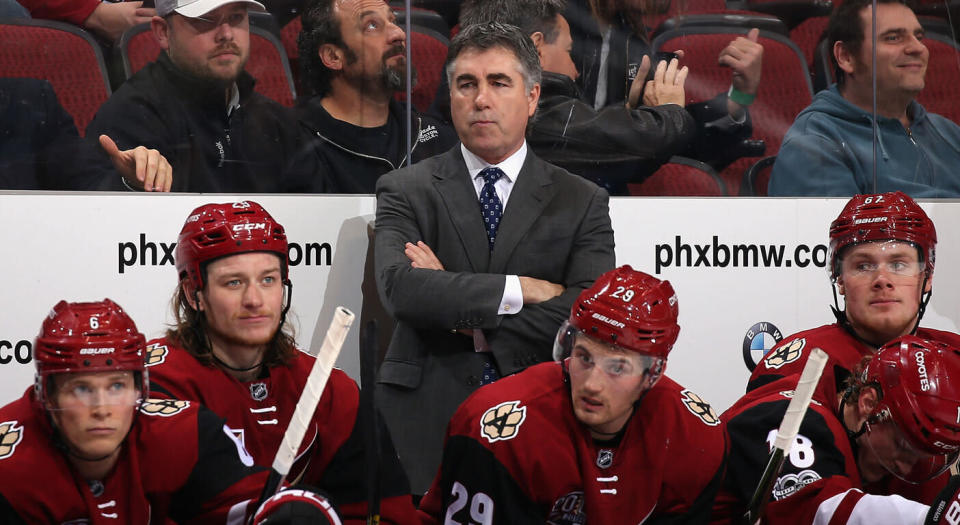Time to see what Dave Tippett can do with elite talent at the top

Because the similarities Edmonton and Arizona share are limited to a basic level of dysfunction and the franchise each belonging to the same division, Dave Tippett was stepping into a situation entirely unlike what he had grown accustomed to when he was unveiled at a press conference Tuesday as the Oilers new head coach.
There are simple and insignificant distinctions between the two markets, of course, such as geographies and a strong divide in terms of public interest. While more deep-seated aspects exist, too, the baggage the Oilers franchise carries with it set against the backdrop of the dynastic success of a previous generation is always top-of-mind.
These aspects do pale in comparison when examining the one material difference between Tippett’s Arizona tenure and the opportunity that exists now with Edmonton.
Through inheriting the most gifted hockey player in the world and one of two 50-goal scorers from this season with Connor McDavid and Leon Draisaitl, respectively, Tippett now has at his disposal everything he lacked throughout his eight reasonably successful, but mostly insubstantial seasons with the Coyotes.
Described as a defence-first coach for keeping deficient rosters competitive throughout his tenure, Tippett can now shed that label and once again demonstrate the abilities that first saw him take charge of an NHL bench in the first place.
“I laugh at that,” Tippett said, shooting down the suggestion that he’s a defensive coach, and quickly pointing out that he first landed an NHL head coaching gig with the Dallas Stars after assembling a dominant power play as an assistant with the Los Angeles Kings.
“I look at myself as a coach that tries to find a way to win with the people that I have.”
Looking at Tippett’s resume, it’s easy to be skeptical. Since his success with the franchise was limited to its time as “Phoenix,” Tippett’s influence has seemed to diminish in line with the changes taking over the game in the high speed, high skill salary cap era.
Tippett is right, however, to point out that his hands were in some ways tied and that he had to demonstrate the ability to maintain competitiveness through other means.
Providing 0.85 points per game during Tippett’s second and third seasons at the helm — and through the most successful stretch of the franchise’s history — Ray Whitney was the closest the Coyotes had to an elite point producer throughout the coach’s entire tenure.
Following Whitney’s departure, the Coyotes were led in scoring for four straight seasons by a defenceman before Radim Vrbata busted that trend in Tippett’s final campaign with a 20-goal, 55-point year. To put that in its proper context, there were 81 players in different markets with a superior per-game scoring rate compared to Arizona’s top offensive contributor in Tippett’s final season in the desert, and many, many more in the four seasons that proceeded it.
Now, Tippett can’t be absolved for Arizona’s failures to produce and deploy high-end talent. But he also wasn’t wrong when he explained on Tuesday that structure, stability, solid goaltending, character and grit were essential to treading water during his time with the Coyotes.
Lacking much of those necessities with Mikko Koskinen in goal and a relatively threadbare roster below McDavid and Draisaitl, there will be challenges for Tippett as he aims to implement a system that works in Edmonton.
But if he is successful working in tandem with Ken Holland to fill out a roster that can fulfill the demands of the structure and discipline he aims to set in place, the ceiling Tippett was once limited by in the absence of elite talent will be raised significantly with McDavid and Draisaitl in the fold.
More NHL coverage on Yahoo Sports

 Yahoo Sports
Yahoo Sports 

